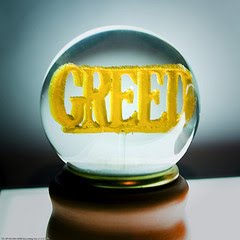Last week, I finished a book called Oryx and Crake, and dystopian science-fiction novel by Margaret Atwood. I bought it at the recommendation of a friend, and I will now pause to insert the necessary statement to make the monitoring powers happy: I am not reviewing this book for gain, nor have I been offered or am I receiving any compensation by an author or publisher for mentioning it here (this, in fact, is not even a review). The cataclysmic future it portrays is easily imagined…I found myself seeing how we could get there from here without significant effort. In fact, it seems a very possible outcome should we simply keep doing what we’re doing.
The book left me thinking a bit of Lewis‘ warning that, just because we can do something, doesn’t mean we should. On a personal level, there are many things that I am physically capable of doing, and, at my worst, emotionally capable of doing, as well. That doesn’t mean that I should. I think a similar theme…a through-line, to use the theatrical term…can be seen internationally as we seek to dominate the world around us, to beat it into submission when it will not go quietly.
I’m not speaking against the huge advantages that the tools of technology provide us…I’m way too much of a geek to do that. I’m thinking more of the gestures we make to bend the natural to a different image, to make it into not even our image, but one that we think will work for the moment. In doing so, we pollute and waste, we clone and experiment, we do things to ourselves under the guise of “medicine” that should never occur. We cut and splice. We wage war and destroy.
I wonder about decreasing life spans at times, about whether or not we look remarkably different from the way we were designed to look. I wonder about so-called “disorders” of attention and behavior and see immediate connections to how we’ve created them. I think of the enormous prevalence of cancer in the area in which I grew up, and I become nervous, not only for myself, but for my family as well, because I’ve seen the havoc brought about by that particular disease, a disease that I think our waste and pollution is largely responsible for creating. I think of my poor eyesight, that I’m nearly blind without my contact lenses, and how that wouldn’t have been the case had it not been for an overabundance of television screen as a child. I think of the various ailments with which we live every day.
I know that there are scientific explanations, and I know the theological answer to this. At the core of the theological answer, however, is pride, and I think that it is pride that drives us to experiment until we do unwitting damage to ourselves. Yet, without that desire, that urge to improve and move forward, that inherent motivation that drives such experimentation, I shutter to think of where we would be. And its so difficult to nail down: we can’t make the blanket statement that inventions for the sake of convenience are all bad. While some are (the frozen dinners that rot our internal organs with their preservative chemicals), others just make sense (like remote controls and online banking). That said, I still wonder what an atmosphere full of the radio waves that drive the lifestyle to which I’ve become so accustomed causes to happen in the long run? For that matter, I wonder about the effects of an apartment filled with radio waves.
In our quest to invent and create and, ultimately, rule, humans are very bold in how we push ahead. Perhaps a bit more forethought as to the potential ramifications should be considered. Many of the conveniences I think of lead to significant lifestyle changes, and those lifestyle changes lead to fundamental shifts in metaphysical perspectives (such as a lack of perceived value in a human life), and those shifts in perspective lead easily to the sorts of consequences Atwood envisions.
And twice in the last few months, in two excellent works of science fiction, I’ve seen the prediction of these consequences preceded by the casting aside of artistic expression and spirituality.
When I think about how we shouldn’t do everything of which we are capable, I think of the reasons why we should not. The things that we can do are the realm of the hard sciences, the inventions and discoveries that facilitate us accomplishing what we do. The reasons why we should reconsider potential Pandora’s Boxes are the realm of spirituality, and this is most often communicated (and perhaps best communicated) through the arts. To say that a dystopia on the level of Atwood’s is literally around the corner sounds unrealistic and harsh, perhaps. But I see creative expression cast aside and treated as inferior to the sciences daily (have any teachers lost their jobs in your area lately? I bet the math teachers stayed while the art teachers left). I see spiritual expression (at least that of my own Christian faith) mocked and looked upon as only being divisive and never healing. Ironically, I see the negative emphasized over the positive, while the wonder of new invention is always predicted in terms of the positive at the expense of the potential negatives. Perhaps because that is where the money is to be made, or the power to be gained. In any case, I see our own, custom-crafted dystopia brewing.
Just because we can, doesn’t mean we should.
Photo Attribution: See-ming Lee
